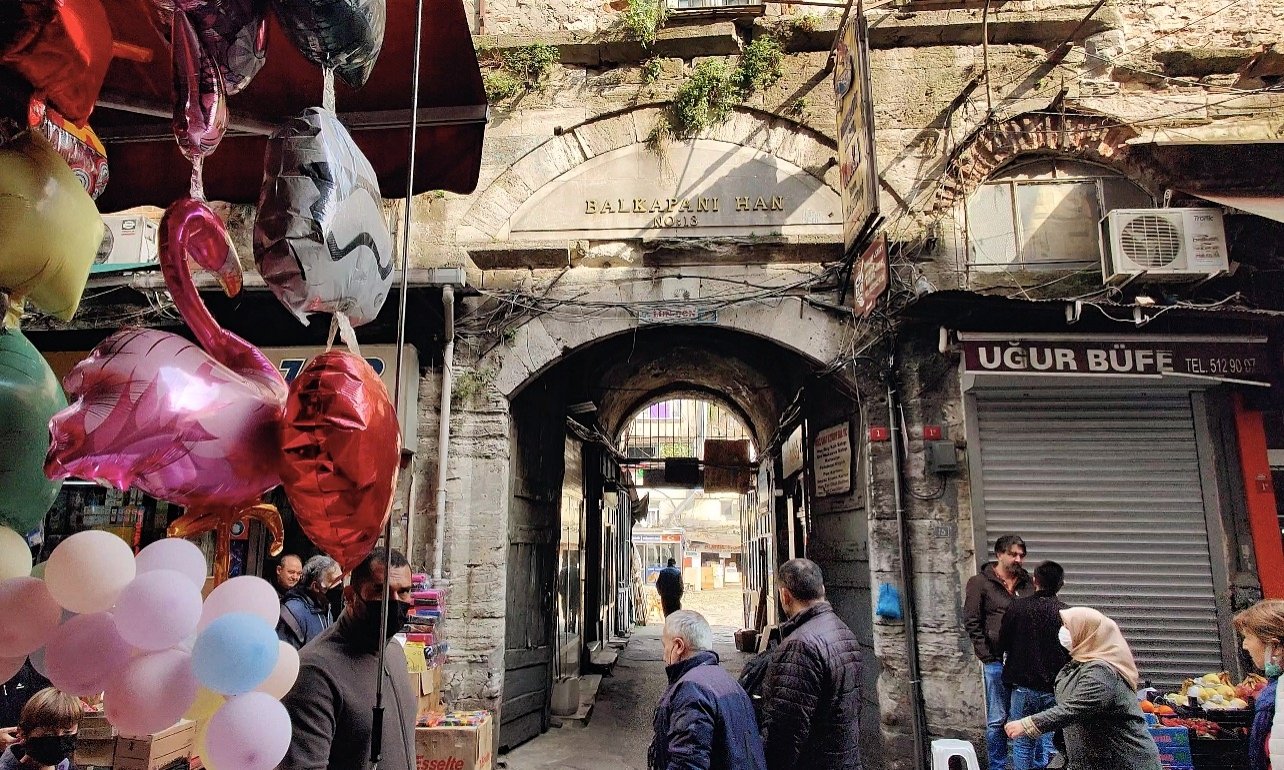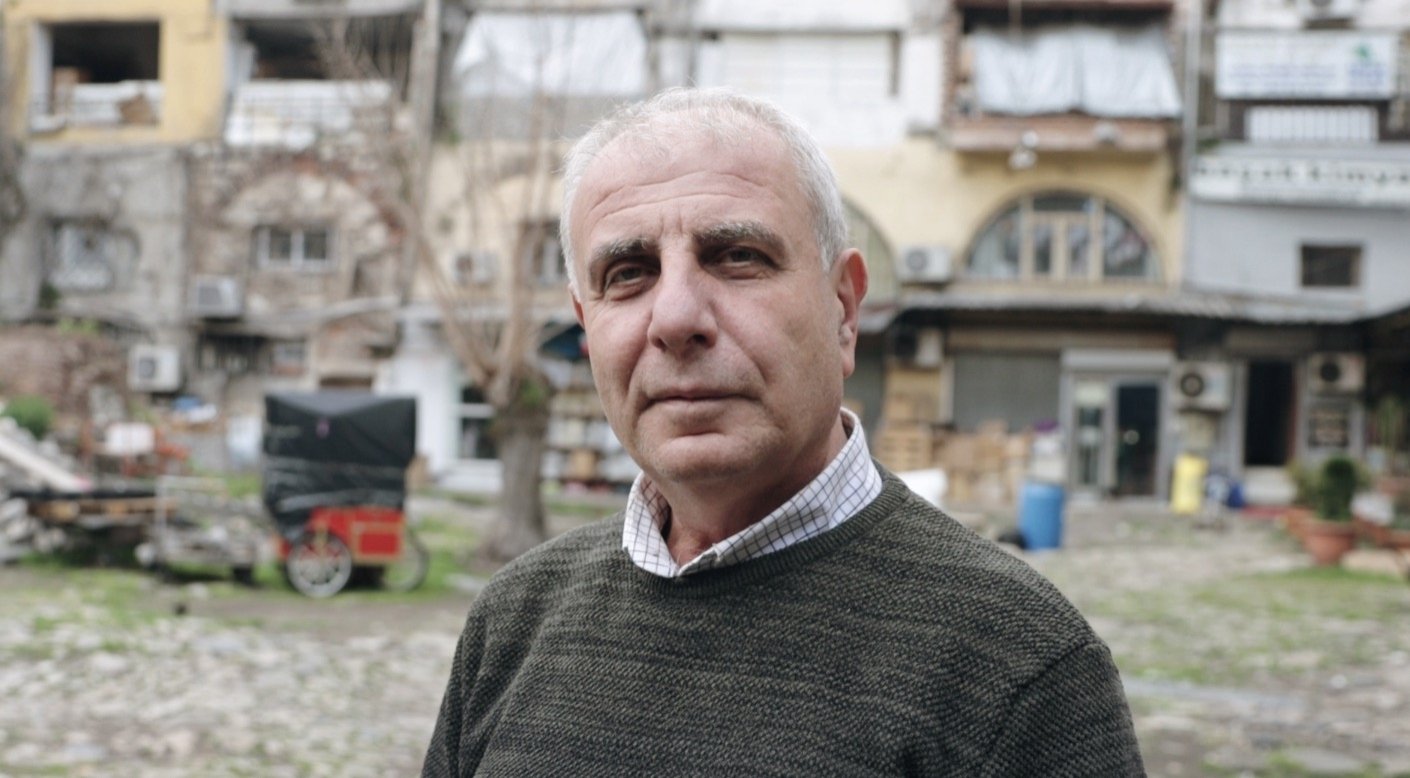© Turkuvaz Haberleşme ve Yayıncılık 2024
Having witnessed two different empires, Balkapanı Inn in Istanbul's Tahtakale stands the test of time. During the Ottoman period, the inn was used as a honey collection and distribution base.
Roughly translated as a honey-trap, Balkapanı, is the only "Kapan" inn that managed to survive around the historical peninsula of Istanbul, where the heart of trade beat since the Byzantine and Ottoman periods, continues to fascinate visitors with its 15-century history and warm atmosphere created by its mixed architectural texture.
Balkapanı was the place where products such as honey, olive oil and soap coming from all over the world were checked, first stored and then distributed to Istanbul and the empire after the conquest of Istanbul. Unkapanı (flour-trap) and Yağkapanı (oil-trap) also have a historical significance yet they have not managed to survive to the present day.

According to the research, Balkapanı Inn, which turned out to be built by the Genoese during the Byzantine period and used for commercial and military purposes, was used for many years as a warehouse on the ground floor, shops where the products were exhibited on the ground floor, and accommodation for the merchants who came by caravans on the upper floors for many years.
The building, which has the appearance of a two-story classical caravanserai, consists of 80 rooms covered with domes.
Today, the inn hosts tradesmen from many commercial sectors who sell paper, flowers, sahlep (a drink made from sahlep root in hot milk and cinnamon), spices and jewelry.
Taking visitors on a historical journey opening to the wide courtyard trough the century-old grand inn gate in Tahtakale, one of the most crowded commercial points of Eminönü, Balkapanı Inn continues its commercial mission.
The old and new shopkeepers of the inn told Anadolu Agency (AA) about Balkapanı, the changes that took place and the story of the building.
Cafer Hamdullah Pur, who worked as a tradesman in Balkapanı Han for 57 years, said that the spirit of commercial life has changed and he misses the old days.
Stating that solidarity dominated in the first years he started to work as a tradesman, "Now the generation has changed. In our time, everyone would solve each other's troubles and help each other. We used to be together in Balkapanı Inn in good and bad times, we were like a family with young and old," Pur said.
Noting that all his friends from the shopkeepers in the inn have left here and many of them lost their lives, Pur added:
"Nothing about the past remains. Those days do not exist. Professions and jobs have changed. We only have a few friends from the past, that's all. We had a candlemaker friend, he passed away. His children continue his profession. I've been Balkapanı for 57 years. Now, trade is inevitably based on money. We used to trade before, but not everything was material. Now I am retired, but I come here to help tradesmen and spend time. I get bored of sitting at home."

Halit Cebecioğlu, a regular of the inn for 50 years and the owner of many shops, gave information about the history of the building and explained its changing atmosphere.
Stating that Balkapanı was built about 1500 years ago, "This is a Genoese structure built in the Byzantine period. We do not know exactly what it was used for at that time. It was used as a 'trap' in the Ottoman period. In other words, it was used to weigh and classify commercial goods. On the upper floors, the people coming in the caravans stayed, and the goods coming downstairs were stored. We are trying to do that." he said.
Noting that the inn, which has witnessed many periods, is now living its quiet days, Cebecioğlu added:
"It was restored at that time and used as a paper warehouse in the following periods. The square was filled with paper to the brim. It was also used for the sale of chemicals. Now there are jewelry, electronic goods, notebook wholesalers and box stores. The interior part is not very active anymore. I've been here since 1991, but I exist here since the 1970s. This is my grandfather's place, I'm the third generation. We have the majority of shops, the courtyards and a large share in the warehouse below."
Saime Çalhan, one of the female shopkeepers of the inn, said that she has loved Eminönü since her childhood and she is happy to trade in such a historical atmosphere.
Stating that she loves the historical peninsula of Istanbul very much, Çalhan told the story of meeting with the inn:
"One day I decided to open a shop on box manufacturing in Eminönü. When I first came here, I asked about a rental shop, and a shopkeeper snapped at me. I got very angry and went into an inn for tea. It was an inn with a huge courtyard. I asked the tea house and there was a shop. I rented it. It was more desolate back then. I became the third woman to open a shop at the inn. Trading and establishing good relations with people hold a special place for me here. The historical texture of this place is truly fascinating. I feel lucky to work in a trade center that is hundreds of years old like Balkapanı Han."
